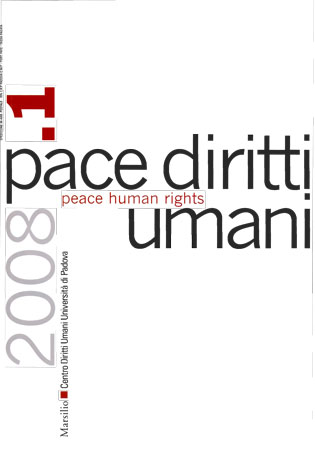Raccolte

«Povertà estrema e diritti umani: i diritti del povero» - Risultati del processo di consultazione tra le organizzazioni internazionali di società civile sulle linee guida formulate dalla Sottocommissione delle Nazioni Unite per la promozione e protezione dei diritti umani
- Contenuto in
- Pace diritti umani - Peace Human Rights, 1/2008
- Tipologia pubblicazione
- Articolo / Saggio
- Pagine
- 93-110
- Lingua
- IT
«Extreme Poverty and Human Rights: The Rights of the Poor» - Results of the Civil Society Consultation on the UN Draft Guiding Principles Produced by the Former UN Sub-Commission on the Promotion and Protection of Human Rights
Andrea Cofelice
On 24 August 2006, the former UN Sub-Commission on the Promotion and Protection of Human Rights approved Resolution 2006/9 containing the Draft Guiding Principles on «Extreme Poverty and Human Rights: The Rights of the Poor». The main importance of this document is due to the fact that it represents the first attempt to develop both a legal instrument dealing with extreme poverty as cause and consequence of human rights violations, and a set of rules of action to put an end to extreme poverty and realise human rights for all. In this sense, it is intended to go far beyond the merely charitable or humanitarian approach which was predominant during the ‘80s and ‘90s.
The Human Rights Council first discussed the Draft during its second resumed session (November 2006): before taking any decision, it requested the High Commissioner for Human Rights to circulate the Guiding Principles, in order to obtain the views of States and other relevant stakeholders, including United Nations agencies and treaties bodies, intergovernmental organisations, special procedures, national human rights institutions, NGOs, and to report to the Council at is seventh session (March 2008).
In response to this request, the UN Non-Governmental Liaison Service launched a consultation among civil society actors, collecting the views of over 60 organisations from around the world, all responding to a set of four questions concerning the strengths, weaknesses, missing elements and the expected impact of the Guidelines. In Italy, the Interdepartmental Centre on Human Rights and the Rights of Peoples of the University of Padua coordinated a similar consultation process among the academic milieux, involving also some of the most representative Italian NGOs, such as FOCSIV (Christian Organizations Federation of International Voluntary Service).
On the basis of all these contributions, it would be desirable that the Human Rights Council could adopt the Draft Guiding Principles as soon as possible, reinforcing the legally binding approach of the document by upgrading it as a formal United Nations Declaration.

